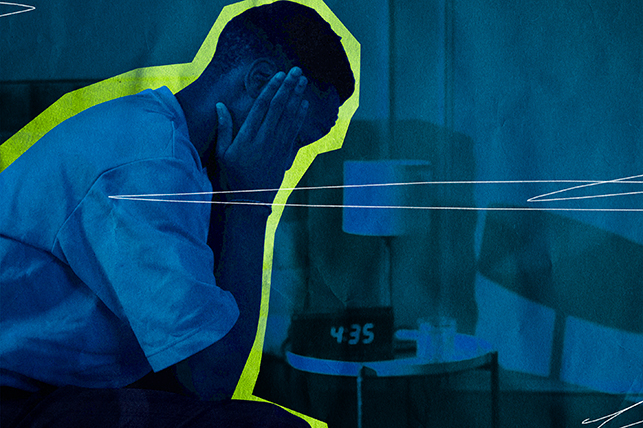Diagnosing and Treating Insomnia

Everyone experiences dreaded nights when no matter how serene their bedroom environment is or how absolutely exhausted they feel, sleep just won't come.
But when these nights start to outnumber the restful ones—and when a lack of sleep creates a negative impact on your overall health—sleep specialists recommend seeking professional care. You could be experiencing chronic insomnia disorder, a common condition experienced by 10 percent to 15 percent of Americans.
Recent research indicated sleep disruptions and disorders, as well as insufficient sleep, can affect sexual function. It's been shown a sleep disorder can contribute to erectile dysfunction (ED) and other urological issues.
The good news is the symptoms can be managed by various treatment modalities.
"In most cases, insomnia's a lifelong condition to manage, but seeing a doctor who is certified in sleep medicine can customize a program that works for your body," said Lauri Leadley, founder and president of Arizona's Valley Sleep Center.
Diagnosing insomnia
If you suspect you're experiencing symptoms of chronic insomnia disorder, the first step is contacting your primary care provider, who can identify possible underlying health issues that may be preventing you from sleeping.
After physical health issues have been ruled out, you may be referred to a mental health professional to diagnose any conditions commonly associated with insomnia, such as depression, anxiety and obsessive-compulsive disorder (OCD).
A sleep specialist can investigate if any other sleep disorders, such as sleep apnea or restless legs syndrome, are keeping you from getting the rest you need.
Po-Chang Hsu, M.D., a medical content expert for SleepingOcean, a Canadian online resource for information and products that support healthy sleep, explained insomnia is not a medical condition that can be easily diagnosed by just answering a few questions.
Instead, he noted your physician will likely run one or more diagnostic tests to investigate the underlying cause of your insomnia:
- Actigraphy. "This test uses a sensor on the ankle or wrist to monitor body activity while sleeping over a few days," he said.
- Bloodwork. "A blood test might help to get insight into an individual's thyroid condition, iron levels or other factors that might contribute to insomnia," Hsu explained.
- Polysomnogram test. "This test measures sleep quality and sleep duration. It can help doctors learn more about one's sleep patterns or problems," he said. "The test also measures brain waves, heart rate, breathing and muscle movements."
Chelsie Rohrscheib, Ph.D., is a researcher in clinical sleep medicine and a sleep specialist at Wesper, a New York City company that produces wearable sleep diagnosis tools. She said maintaining a diary or journal where you log all details of each night's sleep is an effective tool while you seek a diagnosis for your troubled sleep.
"If we, as medical professionals, suspect insomnia, we rely on the patient's sleep history and signs and symptoms," she explained. "We may ask you to keep a sleep log or diary to track your sleep over two weeks. Understanding the amount of sleep you are getting, how long it takes you to fall asleep, how frequently you wake up and how frequently these problems occur will all be important for diagnosing insomnia."
In order to undergo an insomnia diagnosis, Rohrscheib said one or more of the following conditions must be met:
- Difficulty falling asleep for more than 30 minutes a night at least three times a week.
- Waking up frequently in the middle of the night and taking longer than 30 minutes to fall back asleep at least three times a week.
- Waking up at least one hour too early at least three times a week.
"Insomnia is considered acute if it's been occurring for less than three months or chronic if it has been occurring for longer than three months," she said.
Treatment options for insomnia
Once a medical professional has diagnosed you with insomnia, it's time to undergo treatment for the sleep disorder, a long process that Hsu noted usually involves medication or cognitive behavioral therapy (CBT), or a combination of the two.
"Using medication for insomnia is recommended only for a few weeks," he explained. "However, cognitive and behavioral therapy can go on as long as needed to achieve quality sleep. It's best to practice improving the lifestyle that causes insomnia."
- Cognitive behavioral therapy. Hsu said therapists trained to work with insomnia can offer cognitive and behavioral therapeutic techniques in "sleep education and correction, stimulus control for reducing anxieties before bedtime and removing environmental obstacles, as well as relaxation techniques, including meditation and breathing exercises." Readily available apps such as Headspace and Calm can supplement your therapy practice by helping you incorporate mindfulness into your bedtime routine.
- Medication. "A doctor may recommend medications that best improve sleep, depending on an individual's condition," Hsu said. Don't expect to find a quick fix for your insomnia inside a pill bottle, though.
"Individuals who consume medications for insomnia tend to report some common side effects," Hsu noted. "These side effects can also include further problems in daily life, work or social interactions."
He added that the most common side effects associated with sleeping pills used to treat insomnia include:
- A metallic taste in your mouth
- Allergic reactions
- Amnesia
- Diarrhea
- Dizziness
- Drowsiness
- Falls
- Fatigue
- Headache
- Nausea
- Somnolence or excess sleepiness
- Worsening mental health conditions
Rohrscheib noted that treatment for insomnia can last anywhere from a couple of months to several years, depending on the individual. Though sleep studies and medications for insomnia are generally covered by insurance, sleep coaching and insomnia-specific cognitive behavioral therapy may be an out-of-pocket expense for you, she said.
Maintaining good sleep health in the long term
Treating insomnia requires resilience and strength to maintain healthy sleep practices nightly. You may begin to experience better sleep after only a handful of treatment sessions with a sleep specialist, but that doesn't always mean the work is over.
"After your insomnia treatment, it's best to maintain practices that help with sleeping, such as not staying in bed when you're not falling asleep for a long time, avoiding using a computer or smartphone before sleep, avoiding the consumption of heavy foods before bedtime, trying to maintain a fixed sleep schedule, sleeping in a calm environment and meditating regularly," Hsu said.
When the road ahead seems weary, he recommended getting a boost of motivation from online resources, which can provide useful information as well as words of encouragement from fellow insomnia sufferers.
"Social media sites like Facebook and Reddit can be useful for interacting with communities with similar conditions," Hsu recommended. "There are also websites and blogs with helpful information or personal stories about insomnia or other sleep disorders, such as the American Academy of Sleep Medicine's sleep education blogs and the National Sleep Foundation."
Treat insomnia before your health worsens
If you're feeling hesitant to begin treatment for insomnia, you should know that chronic insomnia disorder can lead to a wide range of negative health effects impacting nearly every facet of your overall health. Hsu explained how these symptoms can affect you:
- Heart problems. "A lack of sleep can contribute to the rising risks of heart failure, coronary heart disease or heart conditions linked with distress," Hsu said.
- Higher blood pressure. "Sleeping helps lower and regulate blood pressure, so a lack of sleep for an extended period can increase blood pressure, which in turn causes more heart and blood-related problems," he said.
- Increased risk of asthma. "Insomnia can narrow the airways in the lungs and increase the risk of asthma," Hsu said.
- Increased risk of obesity and weight gain. "A lack of sleep can disrupt your sense of hunger, and while staying awake, the body craves more food, leading to weight gain," he said.
- Memory problems. "The brain processes data and memory while sleeping, so a lack of sleep contributes to memory deterioration and short-term memory issues," Hsu said.
- Pregnancy complications. "Insomnia can increase the chances of having worse labor pain, depression, a cesarean section or a preterm birth," he said.
Leadley noted that when we prioritize healthy sleep by seeking a diagnosis and treatment for insomnia, we step into what we each need and deserve.
"Think of getting good quality sleep as being just as important as eating right, exercising, caring for your skin and hair, and practicing good eye and oral health," she said. "Make your sleep a priority. Know your body and what it needs to function and thrive optimally. You deserve it."


















